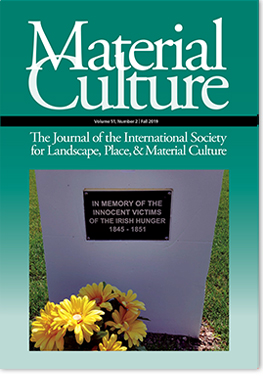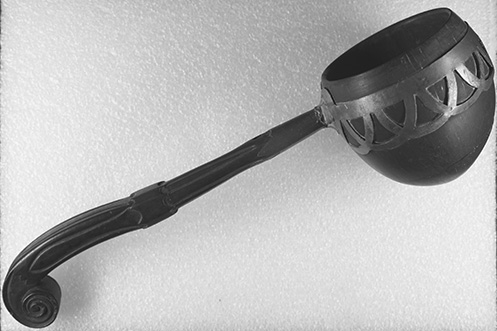Material Culture Culture is printed two times a year for members of PAS:APAL. It is abstracted and indexed in: JSTOR, ProQuest, History and Life, Historical Abstracts, GeoAbstracts, and the MLA International Bibliography. You may download a PDF of the table of contents of the current issue here. Fall 2019 Material Culture includes:
 The Forgotten New England Coconut Dipper in the 19th-Century American Landscape
The Forgotten New England Coconut Dipper in the 19th-Century American Landscape
Kathleen E. Kennedy, Penn State University – Brandywine
Abstract: With their origins stretching back into colonial history, coconut dippers, halved coconut shells set on long handles, stand among the least well known of 19th-century New England’s manufactured goods. Balancing attractiveness with economy and utility, coconut dippers were viewed as integral to healthy household water management, and they were sold all over the US. Coconut dippers became so traditional that when new manufacturing techniques enabled inexpensive dipper manufacture out of non-organic materials late in the 19th century, the benchmark against which innovations were designed remained the coconut dipper. Coconut dippers remind us of the necessity of taking the material culture of daily life into account when we assess domestic, regional, and even national landscapes.

A Forgotten Quarantine Landscape: The Staten Island Marine Hospital Quarantine 1799 - 1858
Amanda Weber, Oklahoma State University
Abstract: Quarantine and isolation practices leave behind landscapes of lasting policies, procedures, and structures. The structures and history surrounding the landscapes can work their way out of collective memory. Through a critical examination of records from the local Board of Health, historical maps, and local archives, I construct a timeline of the quarantine landscape of the Staten Island Marine Hospital and its imprint left on New York history. A Memorial Green now embodies what was once the Staten Island Marine Hospital Quarantine in front of the new Courthouse, with obelisks and a headstone to commemorate the immigration journey of those attempting to escape the Great Famine (1845–1849). .
Dr. Geo-Love or: How I Learned to Stop Quantifying and Love the Culture
Thomas L. Bell
An autobiographical essay.
